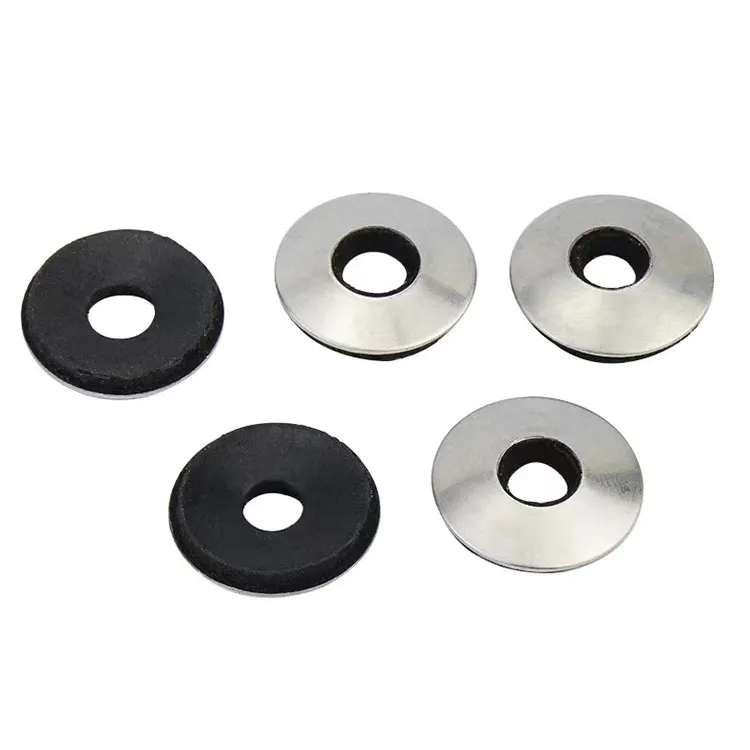Everything You Need to Know About Aluminum Steel EPDM Bonded Washers
2024-10-30
1. What Is an Aluminum Steel EPDM Bonded Washer?
An Aluminum Steel EPDM Bonded Washer is a composite washer made from two primary materials: a metallic core (aluminum or steel) and an outer layer of EPDM (Ethylene Propylene Diene Monomer) rubber. The metal core provides strength and rigidity, while the EPDM rubber ensures a tight seal by offering flexibility, weather resistance, and insulation. These washers are commonly used in fastening applications where both sealing and structural strength are required.
2. What Are the Main Applications of These Washers?
Aluminum Steel EPDM Bonded Washers are popular in a variety of industries, including:
- Roofing and construction: Used with screws to seal metal roofs and prevent leaks.
- HVAC systems: Provide airtight seals in ventilation ducts.
- Automotive: Help prevent vibration and water ingress in engine parts.
- Electronics: Offer electrical insulation and protection in outdoor equipment.
- Marine applications: Provide corrosion resistance in boats and docks.
3. How Does the EPDM Rubber Benefit the Washer?
EPDM rubber is a key component in these washers due to several important properties:
- Weather resistance: Withstands harsh environmental conditions, including UV exposure and extreme temperatures.
- Waterproofing: Prevents water leakage, making it ideal for roofing and outdoor installations.
- Flexibility: Absorbs vibrations and accommodates movement in mechanical joints.
- Chemical resistance: Resists degradation from oils, ozone, and some chemicals.
4. Why Use Aluminum or Steel as the Core?
The choice of aluminum or steel for the washer's core depends on the specific application:
- Aluminum: Lightweight and highly resistant to corrosion, making it ideal for outdoor or marine environments.
- Steel: Provides higher strength and durability, often used in heavy-duty applications such as construction. In some cases, galvanized or stainless steel is used to further enhance corrosion resistance.
5. What Are the Advantages of Bonded Washers Compared to Regular Washers?
Bonded washers offer several advantages:
- Superior sealing: The EPDM layer prevents water and air leaks.
- Vibration reduction: Absorbs mechanical vibrations, reducing noise and wear on parts.
- Weatherproof: Durable against moisture, UV rays, and extreme temperatures.
- Corrosion resistance: Aluminum and stainless steel variants perform well in corrosive environments.
- Tight fastening: Prevents loosening of screws over time by creating a firm seal.
6. How Are Aluminum Steel EPDM Bonded Washers Installed?
Installation is simple:
1. Place the bonded washer on the fastener (such as a screw or bolt) with the rubber side facing the surface to be sealed.
2. Tighten the fastener until the EPDM layer compresses slightly, creating a seal.
3. Avoid over-tightening, as it may damage the rubber or compromise the seal.
These washers are often used with self-drilling screws in roofing applications for quick and secure installation.
7. What Sizes Are Available for These Washers?
Aluminum Steel EPDM Bonded Washers come in a variety of sizes, typically matching the fasteners they accompany. Common outer diameters range from 10 mm to 30 mm, and the inner diameter corresponds to the screw size. Custom sizes are also available for specific applications.
8. How Do These Washers Perform in Harsh Conditions?
These washers are designed to endure extreme environments:
- Temperature range: EPDM rubber remains flexible and functional in temperatures from -40°C to 120°C (-40°F to 248°F).
- UV exposure: The EPDM layer resists sun damage, maintaining performance in outdoor settings.
- Corrosive environments: Aluminum or stainless steel cores prevent rust and corrosion, ensuring a longer lifespan.
9. What Are the Common Issues with Bonded Washers?
Though highly effective, there are a few challenges to be aware of:
- Over-tightening: This can damage the EPDM layer, reducing its sealing ability.
- Material mismatch: Choosing the wrong metal core for the environment (e.g., regular steel in a marine setting) can result in corrosion.
- Aging of EPDM: Over long periods, EPDM can harden and lose flexibility, though this process takes years under normal conditions.
10. What Are the Differences Between Aluminum and Steel EPDM Bonded Washers?
- Aluminum core: Lighter, more resistant to corrosion, ideal for applications exposed to moisture or marine environments.
- Steel core: Stronger and better for high-load applications, such as heavy machinery or construction, where durability is key.
The choice between the two depends on whether lightweight performance or heavy-duty strength is prioritized.
Conclusion
Aluminum Steel EPDM Bonded Washers are a reliable solution for applications that require both structural strength and airtight sealing. With their ability to resist corrosion, absorb vibration, and withstand harsh weather conditions, these washers play an essential role in industries ranging from roofing to automotive. Selecting the right washer—whether with an aluminum or steel core—ensures durability and performance, making them an indispensable component in modern fastening systems.



